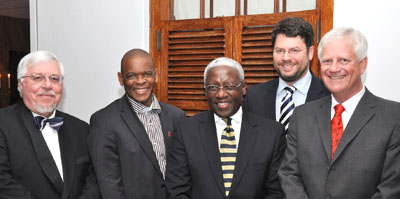Latest News Archive
Please select Category, Year, and then Month to display items
22 September 2021
|
Story Michelle Nöthling
|
Photo Supplied
 Annemarie Le Roux.
Annemarie Le Roux.
“I love working with children.” This is one of the first things Annemarie le Roux mentions when asked to describe herself. This love for children propelled Annemarie into the field of education and she graduated in 2006 with a BEd in Foundation Phase at the UFS. Annemarie immediately immersed herself in the Deaf community, enriching the lives of children at the Thiboloha School for the Deaf in Qwaqwa and the De la Bat School for the Deaf in Worcester.
The academic world enticed Annemarie back to the University of the Free State (UFS) and she was appointed as a junior lecturer in the Department of South African Sign Language (SASL) and Deaf Studies in 2013. Going from strength to strength, Annemarie completed her master’s degree in SASL in 2019, and published an
article earlier this year that she co-wrote with Marga Stander. In this article, they found that SASL “has become an increasingly popular language that hearing university students want to learn as a second language” and subsequently explored different teaching methods used for this emerging group of interested students.
Although now firmly established in academia, Annemarie is still committed to the practical application of SASL. “I am closely involved in student and community engagement through the
SIGNALS Sign Language student association that helps empower the Deaf community and South African Sign Language.” She also interprets for the Deaf community whenever she gets an opportunity, as well as for Deaf students in class and meetings.
On the importance of Sign Language and the recognition of the Deaf community in South Africa, Annemarie believes it will open greater opportunities for development. “More people will be able to learn SASL, and it might even become a subject in school for hearing children.”
UFS informs judicial officers about human trafficking
2010-08-11
 |
At the conference on human trafficking for judicial officers were, from the left: Prof. Johan Henning, Dean of the Faculty of Law at the UFS; Mr Ace Magashule, Premier of the Free State; Chief Justice, Justice S Nqcobo; Mr Andries Nel, Deputy Minister of Justice and Constitutional Development; and Judge Faan Hancke, acting Judge President of the Free State.
Photo: Stephen Collett |
The Faculty of Law’s Centre for Judicial Excellence at the University of the Free State (UFS) in cooperation with the South African Chapter of the International Association of Women Judges (IAWJ) and the Department of Justice and Constitutional Development’s Gender Directorate hosted a conference for judicial officers from the Magistrate’s Courts, the Regional Courts and the High Courts on “Human trafficking: Equal rights, equal opportunities and progress for all”.
The Deputy Minister of Justice and Constitutional Development, Mr Andries Nel delivered a keynote address at this event. He said that anti-human trafficking legislation would be passed in the near future. Also delivering a key note address at the conference was the Chief Justice, Justice Sandile Nqcobo.
The aim of the conference was to empower judicial officers on the topic of human trafficking. A number of presentations from amongst others Adv. Beatri Kruger from the UFS’s Unit for Children’s Rights served to inform magistrates and judges about the characteristics, causes, the human trafficking process and the consequences of human trafficking on victims. Delegates also discussed the impact of human trafficking on human rights and the comprehensive response to human trafficking with a clear focus on the victims’ rights during criminal proceedings.
This conference was attended by 100 judicial officers from across South Africa.